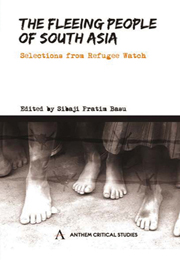Book contents
- Frontmatter
- Contents
- Acronyms and Abbreviations
- Foreword by Ranabir Samaddar
- Preface
- ETHICAL ISSUES
- LAWS
- SOUTH ASIA
- INDIA
- GENDER
- INTERVIEW/CORRESPONDENCE
- REPRESENTATIONS
- Introduction
- Creativity's Mirror
- Writing Displacement: Creativity and Objectivity
- Boundaries, Borders and Bodies
- Forced Displacement and Identity Formation in the EU
- The Changing Scales of Good and Evil: Morality Plays at the Profiled EU and US Borders
- Index
Forced Displacement and Identity Formation in the EU
from REPRESENTATIONS
Published online by Cambridge University Press: 05 March 2012
- Frontmatter
- Contents
- Acronyms and Abbreviations
- Foreword by Ranabir Samaddar
- Preface
- ETHICAL ISSUES
- LAWS
- SOUTH ASIA
- INDIA
- GENDER
- INTERVIEW/CORRESPONDENCE
- REPRESENTATIONS
- Introduction
- Creativity's Mirror
- Writing Displacement: Creativity and Objectivity
- Boundaries, Borders and Bodies
- Forced Displacement and Identity Formation in the EU
- The Changing Scales of Good and Evil: Morality Plays at the Profiled EU and US Borders
- Index
Summary
INTRODUCTION
Forced displacement is a topical issue in all developing countries. It is often seen as an inevitable consequence of development. Thus, forced displacement and social problems associated with it are often represented almost like a ‘collateral damage’ of modernization, which, in turn, is seen as an irrevocable solution for ‘ills’ of the so-called Third World. It is only very seldom if ever that we discuss about forced displacement in the context of so-called highly developed political communities, such as the European Union (EU). This is very unfortunate since forced displacement is connected to the ways European societies are governed. […]
Perhaps, one reason why forced displacement is not seen as such a pressing problem in the EU countries is that once forced displacement takes place due to environmental disasters or some infrastructure development projects, it is thought to be governed in an organized way following the procedures of good governance. While this arguably is a case, what remains unrecognized is that forced displacement of people is conducted also on grounds other than environmental disasters and development. […]
In the European context it is commonplace to locate identity related forced displacement into Europe's ‘peripheries’, such as the Balkan region. But the EU itself is in fact a significant generator of forced displacement. This is not only because the EU countries have played a central role in restructuring world economy which has put people on the move, but it is also a case in a much more immediate sense. Every year about 350,000 people are deported from the EU.
- Type
- Chapter
- Information
- The Fleeing People of South AsiaSelections from Refugee Watch, pp. 424 - 435Publisher: Anthem PressPrint publication year: 2009



